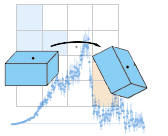
| HOME | PEOPLE | RESEARCH | ACADEMICS | TRAVEL/VISITORS | LINKS | CONTACT |

|
Web Mail
Mailing Lists
Computing Resources
Site Map
Optimal Control of Coupled Spins in the Presence of Relaxation
Prof. Navin Khaneja, Harvard University
Wednesday, January 21, 20044:00 PM to 5:00 PM
Jorgensen 74
Control of quantum ensembles has many applications ranging from coherent spectroscopy to quantum information processing. In practice, the quantum system of interest interacts with its environment which leads to the phenomenon of relaxation. This results in signal loss and ultimately limits the range of applications.
In this talk, using methods of optimal control, I will derive fundamental limits on how close can an ensemble of nuclear spins be driven from its initial state to a desired target state in the presence of relaxation. In particular, I will compute the maximum efficiency of polarization and coherence transfer between coupled nuclear spins in presence of very general decoherence mechanisms that include interference effects between noise terms. Such coherence transfer operations are important in high resolution nuclear magnetic resonance (NMR) spectroscopy of proteins. With increasing size of molecules or molecular complexes, the rotational tumbling of the molecules in solution becomes slower and leads to increased relaxation losses. When these relaxation rates become comparable to the spin-spin couplings, the efficiency of coherence transfer is considerably reduced, leading to poor sensitivity and increased measurement times. I will give analytical characterization for the relaxation optimized pulse sequences (control laws) which maximize the efficiency of coherence transfer. I will show how these problems lead to the study of a new class of control systems with rich mathematical structure.
|
©2003-2011 California Institute of Technology. All Rights Reserved webmaster |
|